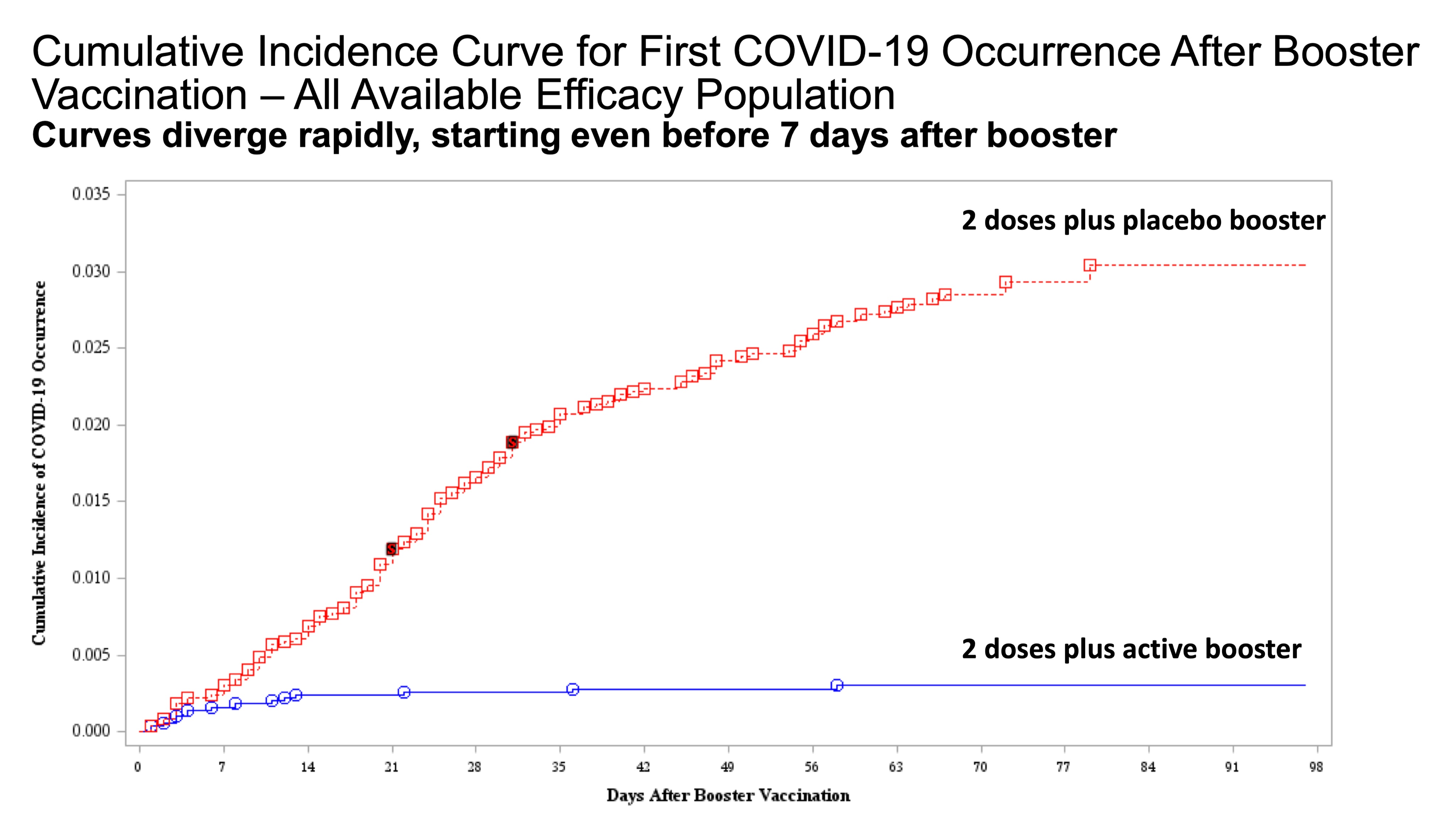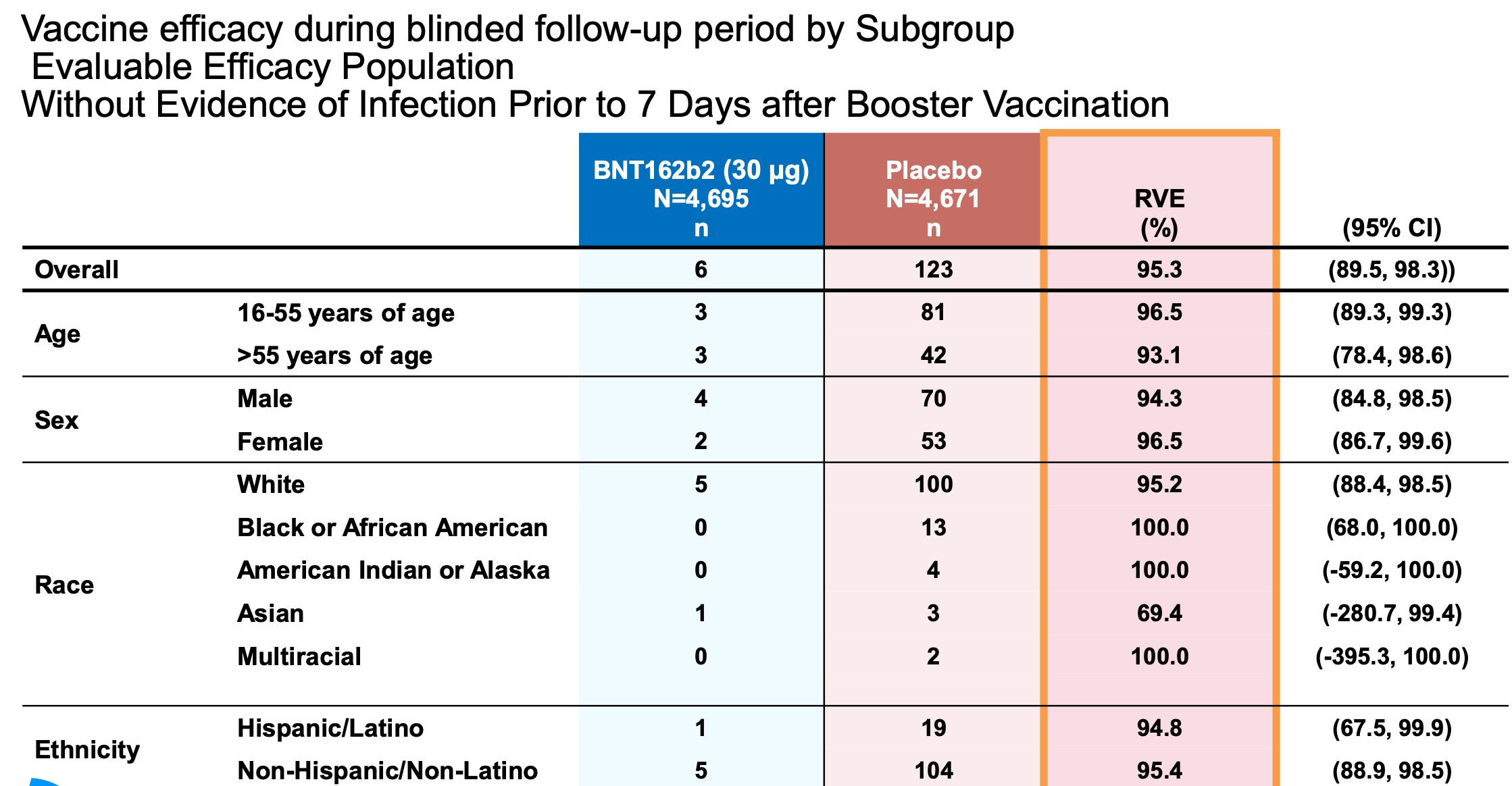Tiodorović je za Blic rekao da bi se imunizacija protiv koronavirusa u budućnosti mogla obavljati dva puta godišnje.
N1
 Re: VAKCINA
Re: VAKCINA Re: VAKCINA
Re: VAKCINA Re: VAKCINA
Re: VAKCINA Re: VAKCINA
Re: VAKCINA Re: VAKCINA
Re: VAKCINA Re: VAKCINA
Re: VAKCINA Re: VAKCINA
Re: VAKCINA Re: VAKCINA
Re: VAKCINA Re: VAKCINA
Re: VAKCINA
 Re: VAKCINA
Re: VAKCINAMór Thököly wrote:Jbg, za deltu cini mi se da i dva fajzera/moderne rade poso. Ako bude nesto novo...
 Re: VAKCINA
Re: VAKCINABREAKING: FDA has just authorized Pfizer and Moderna boosters for all adults, 6 months after initial doses, regardless of age or risk factors. (All J&J recipients should receive boosters 2 months after first dose.) This is really important as #covid19 infections are on the rise.
— Leana Wen, M.D. (@DrLeanaWen) November 19, 2021
 Re: VAKCINA
Re: VAKCINAFirst look at the only randomized trial of a booster vaccine data (Pfizer) today https://t.co/UEa1OUDvzU
— Eric Topol (@EricTopol) November 19, 2021
95% efficacy vs symptomatic infections, consistent across all age, sex, race, ethnicity and comorbid condition subgroups
Benefit seen very early pic.twitter.com/bSarj5263t
Side by side event curves for the original Pfizer vaccine trial vs the Booster trial
— Eric Topol (@EricTopol) November 19, 2021
You can see the curves diverge about a week earlier with a booster, ~14 vs 7 days, which aligns with much faster induction of neutralizing antibodies pic.twitter.com/WhnZbjyIXj




 Re: VAKCINA
Re: VAKCINA

 Re: VAKCINA
Re: VAKCINA Re: VAKCINA
Re: VAKCINA Re: VAKCINA
Re: VAKCINA Re: VAKCINA
Re: VAKCINA Re: VAKCINA
Re: VAKCINA Re: VAKCINA
Re: VAKCINAhttps://tass.com/society/1364365
Nasal COVID vaccine causes minimum side effects — developer
According to deputy director of the Gamaleya National Research Center of Epidemiology and Microbiology Denis Logunov, its use will make it possible to ensure extra protection in the upper respiratory airways
MOSCOW, November 21. /TASS/. A nasal form of the coronavirus vaccine causes minimum side effects and its use will make it possible to ensure extra protection in the upper respiratory airways, deputy director of the Gamaleya National Research Center of Epidemiology and Microbiology, Denis Logunov, said on Sunday.
"It [the use of a nasal vaccine] is convenient for vaccination. It is painless, with an absolute minimum of side effects. Moreover, it will make possible to achieve the main goal: to develop systemic immunity after the primary vaccination and to create an additional barrier in the upper respiratory airways after the additional intranasal immunization," he said at a meeting with Russian President Vladimir Putin.
According to Logunov, the use of the nasal vaccine will begin shortly after the clinical tests.
In October, the Gamaleya Center received a Russian health ministry’s permit for the second phase of clinical tests of a nasal form of the coronavirus vaccine. The Center’s director Alexander Gintsburg said that the nasal form would be an addition to the regular vaccine to ensure an extra barrier to the infection.
 Re: VAKCINA
Re: VAKCINA Re: VAKCINA
Re: VAKCINA Re: VAKCINA
Re: VAKCINAhttps://www.philstar.com/lifestyle/health-and-family/2021/09/18/2128050/vaccine-nasal-sprays-aim-shut-door-virusVaccine nasal sprays aim to 'shut door' on virus
Could delivering COVID-19 immunity directly to the nose -- the area of the body via which it is most likely to be transmitted -- help conquer the pandemic?
The World Health Organization says clinical trials are underway to evaluate eight nasal spray vaccines that target COVID-19.
The most advanced effort so far by China's Xiamen University, the University of Hong Kong and Beijing Wantai Biological Pharmacy has completed phase-2 trials.
"When the virus infects someone it usually gets in through the nose," said researcher Nathalie Mielcarek who is working with the Lille Pasteur Institute to develop a nasal spray vaccine against whooping cough.
"The idea is to shut the door."
An article published in Scientific American in March urged developing nasal spray vaccines because they have an immediate effect on the virus in an infected person's mucus.
There they trigger production of an antibody known as immunoglobulin A, which can block infection.
"This overwhelming response, called sterilising immunity, reduces the chance that people will pass on the virus," said the article.
The vaccines currently available offer strong protection against severe forms of COVID-19 but are less reliable at preventing the spread of the virus.
Stimulating immunity directly in the nose "lowers the risk of infecting other people", said Mielcarek.
"From there you have less of the virus infecting the lungs and so fewer severe cases since the viral load is lower," she added.
An article published in March by Gavi the Vaccine Alliance noted other advantages, including the fact that the sprays don't need refrigeration and don't need to be administered by health professionals.
"People would be able to self-administer them at home," the article says, adding "they are likely to be more popular for the millions of people who don’t like needles".
And in a French study on mice presented last week, 100 percent of subjects vaccinated with the spray survived infection by Covid-19 while all unvaccinated mice died.
"The vaccinated animals... showed low levels of the virus so they are not contagious anymore -- that's one of the advantages of the nasal spray," Philippe Mauguin, CEO of the French institute that hopes to patent the vaccine told AFP.
Isabelle Dimier-Poisson who led the research has high hopes.
"It could allow us to get back to life before the pandemic, without social distancing, and without masks," she said.
 Re: VAKCINA
Re: VAKCINAneki tzv. "naučnik" bi rekao da je to potpuno nov koncept, da mukozni imunitet nosi sa sobom razne izazove kao što je savladavanje razređenja u mukusu - a to je samo jedan problem od mnogih...kad uzmeš u obzir vreme početka rada na nazalnim vakcinama i datum početka epidemije, mislim da se sa sigurnošću može reći da, kako si rekao, već od starta jače rade.MNE wrote:e sad zašto se nije u startu jače radilo na razvoju nazalnih vakcina obzirom da su u teoriji mnogo efikasnije jer sprečavaju već u startu virus da uđe u organizam...